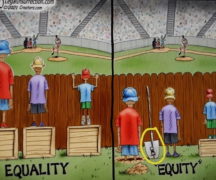The recent article entitled “‘Boogeyman’ in the classroom — bills would ban critical race theory” has been much on our minds. If we do not teach “‘divisive’ concepts on race, color, nationality or gender” how can we teach about any of our wars or conflicts and thus learn from our past? In teaching about World War I, would it be divisive to teach that the Germans were our enemy? To some, perhaps. Would it be divisive to teach the ramifications of being German or Japanese Americans during WWII? Would it be divisive to teach about the Japanese-American Internment Camps, because this would make Americans uncomfortable?
The PBS documentary on Viet Nam laid bare the facts and rationale behind the extreme cultural and political conflict in America during that time. Would the teaching of that segment of our history be outlawed if Ohio House Bill 322 and 327 were passed, as the divisions in opinion about that conflict still exist? And certainly our most recent undeclared wars in Iraq and Afghanistan are divisive. Perhaps Muslims or immigrants from the Middle East might object to the teachings about these invasions of their homelands.
Could analysis of these conflicts be taught in our colleges and universities without threat of punitive action? What could be taught about Prohibition, the Women’s Movement, or the Civil Rights Era if these bills pass? The dominance of white men in the text books used in our schools throughout our history makes US uncomfortable— so perhaps the textbooks should be revised to make them less divisive and more to OUR “comfort’ level.
If children are not taught the facts about slavery as a part of our history, they will grow up ignorant of our history. This is not a matter of misplaced “guilt,” it IS our history. The ramifications of slavery resulted in our only Civil War, emancipation of said slaves, reconstruction and the formation of the KKK which resulted in the Jim Crow era, which resulted in the mass migration of blacks to the North, which resulted in the settling of inner-cities by people-of-color which resulted in white mass-migration to the suburbs— are our children too delicate to learn this history? How can these facts be taught without being considered “divisive” by citizens in a country as politically divided as ours?
This leaves out the effect of immigration to our country’s development— what could be taught about the Irish and German influx through Ellis Island and into New York City? Will the teaching about the resultant tenements in NYC be outlawed if “divisive concepts” are not allowed in our schools? And will we be forced to ignore the effects of migrant labor on the harvesting of our food supply? How should the evolution of Mexican-Americans in our country be addressed without the possibility of being considered “divisive”?
Then there is the whole conundrum of how to teach the history of the “Indian Wars” between the European settlers and the Native Americans who occupied this land for eons before it was “discovered” by Christopher Columbus! The teaching of the Battle of Little Bighorn or Custer’s Last Stand, Wounded Knee, the Homestead Act, and so much more is extremely divisive— so should educators not teach these for fear that they will run amuck of these new laws?
We assumed that critical theory and analysis of all issues was a goal of a college education! Should we hamstring university professors with laws restricting their ability to present issues for fear of litigation?
To learn more about the restrictive language of these bills to our teachers, school districts, and curriculum from elementary through higher education go to:
https://www.legislature.ohio.gov/download?key=17005&format=pdf
https://www.legislature.ohio.gov/download?key=16997&format=pdf
When you read through these summaries, please think of all the “straw men” and “red herrings” upon which this law is based. For example, Critical Race Theory does not argue that “One nationality, color, ethnicity, race, or sex is inherently superior to another nationality, color ethnicity, race, or sex.” It teaches quite the opposite! These bills open the doors for litigations that will enrich the pockets of lawyers at the expense of already cash-strapped school districts.
To oppose Ohio House Bill 322 and 327, please contact Rep. Haraz N. Ghanbari at (614)466-8104 or rep03@ohiohouse.gov, State Board of Education 2nd District Rep (includes Wood Co.) Kirsten Hill at (440)282-5005 or Kirsten.Hill@education.ohio.gov, Ohio State Board of Education President Laura Kohler at (614)425-0183, and Gov. Mike DeWine at (614)466-3555.
Jean and Christopher Geist
Bowling Green




